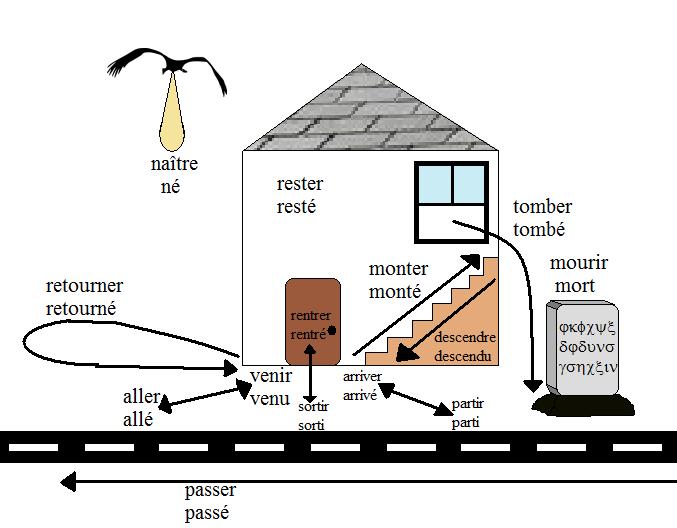Grammaire 1 Passé composé avec être
cgloor
On étudie !
Le passé composé avec être
“La Maison” by TomasBat is licensed under CC BY 4.0
Certain verbs must be conjugated with the être auxiliaire in the passé composé. These verbs are often about motion or displacement. Take, for example the following verbs that we have seen already: aller, arriver, descendre, partir, sortir, passer, rentrer, and rester. These verbs are all about “going”, “arriving”, “leaving”, “passing”, “going back” and “staying” — all actions that are related to movement or displacement of a subject.
L’auxiliaire et le participe passé
Conjugating these verbs means two things:
(1) You use être instead of avoir as the auxiliary verb.
(2) the past participle must agree with the subject in gender and number.
Here is the example of the verb aller:
Conjugaison du verbe aller au passé composé
| Français | Anglais |
|---|---|
| Je suis allé(e) | I went, have gone |
| tu es allé(e) | you went, have gone |
| il, elle, on est allé(e) | he, she, it went, has gone |
| nous sommes allé(e)s | we went, have gone |
| vous êtes allé(e)(s) | you went, have gone |
| ils, elles sont allé(e)s | they went, have gone |
Just like an adjective, the past participle (le participe passé) of this verb has to agree with the subject:
Gender agreement of past participles
| Nombre | masculin | féminin |
|---|---|---|
| singulier | allé | allée |
| pluriels | allés | allées |
Quels verbes prennent être?
Below is a list of common verbs that take être in the passé composé. You can memorize them by thinking of the actions taking place inside and outside of the house (as per the picture above). Alternatively, there is a well-known mnemonic device for remembering which verbs are conjugated with être. If you can remember “Dr. and Mrs. Vandertramp”, you’re halfway there: each letter in this phrase corresponds to the first letter of a verb that requires être.
In the following table, the letters in bold spell out the phrase “Dr. & Mrs. Vandertramp” from top to bottom:
|
Français |
Anglais |
Exemple (féminin + singulier) |
|---|---|---|
| Devenir | to become | elle est devenue |
| Revenir | to return | elle est revenue |
| Monter | to go up, mount | elle est montée |
| Retourner | to go back, return, send back | elle est retournée |
| Sortir | to leave, go out | elle est sortie |
| Venir | to come | elle est venue |
| Aller | to go | elle est allée |
| Naître | to be born | elle est née |
| Descendre | to descend, go down | elle est descendue |
| Entrer | to enter | elle est entrée |
| Rester | to stay, remain | elle est restée |
| Tomber | to fall | elle est tombée |
| Rentrer | to go back, come back | elle est rentrée |
| Arriver | to arrive, get somewhere | elle est arrivée |
| Mourir | to die | elle est morte |
| Partir | to leave (for) | elle est partie |
A few important notes on these so-called House (or Dr & Mrs Vandertramp) verbs:
Passer (to pass by):
In French, the verb passer is at least two different words! How? Well, for the same reason that the words “mean” (cruel), “mean” (to signify), “mean” (to intend), “mean” (excellent) and “mean” (middle point) are 5 different words in English. It all depends on the context.
So, when the passé composé of the verb passer takes être it means “to pass by”. It takes the avoir auxiliary, however, when it means “to spend time”. But it can have even more meanings depending on the context beyond the verb. For more information on this, you can read: Passer used with avoir vs. être in le passé composé.
Watch this video: The verb passer in French: avoir vs. être.
Sortir (to go out):
When the verb sortir takes être, it means “to go out”, or “to leave”. When it takes avoir it means “to take someone or something out”: Elle est sortie de la maison (She left the house) vs. Elle a sorti la poubelle (she took out the trash).
Naître & mourir (to be born and to die)
Notice that the past participles for naître (né) and mourir (mort) are irregular.
Watch these videos for additional explanations and examples of the passé composé with être:
Review the rules for past participle agreement with these video tutorials :
- Past Participle agreement with avoir
- Past Participle Agreement: être
- Review of past participle agreement with être & avoir
Watch the video Dr. and Mrs. Vandertramp Story to review the passé composé with être.


